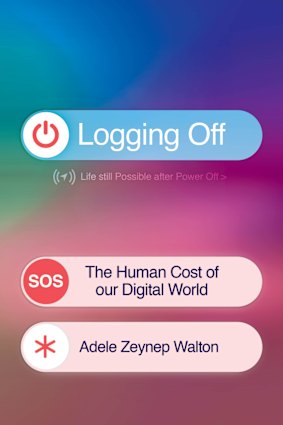
TECHNOLOGY
Logging Off
Adele Zeynep Walton
Trapeze, $55
“Why a book,” an intern asked Facebook executive Sheryl Sandberg after the launch of her memoir Lean In, “and not something else like another TED Talk?” According to the recent tell-all Careless People, Sandberg claimed books still held a distinct cultural cachet; she also deployed them in photo opportunities with great success.
Following in Sandberg’s footsteps, UK journalist Adele Zeynep Walton has written Logging Off, a personal account of online life, a diatribe against social media – and another book made not to be read so much as posted on Instagram. Walton, born at the very end of the last millennium, is “part of the last generation of children that grew up without smartphones and tablets, but part of the first generation of teenagers who had social media”.
In her childhood, she played Xbox and watched YouTube; as a teenager, she reblogged Tumblr posts and sent Snapchats. In her mid-20s she is still, despite the book’s title, very online: she scrolls, she makes TikToks, and her screen time can exceed nine hours a day. Building on her career in journalism and on Substack, she wrote Logging Off “not [as] an expert in technology nor a leader in a Big Tech firm, but [as] a human being who had an incredible sister”. That sister, Aimee, was “one of the countless number of often invisible victims of online harm”.
Aimee’s story involved a life spent mostly online, in which she eventually found herself on a forum promoting self-harm and suicide. Her despair mostly hidden from her family, she eventually disappeared and ended her life in a hotel room with a stranger. She was, in Walton’s account, a victim of an online sphere that “capitalises on the despair and hopelessness of those who are in need”.
Across 11 chapters, Walton pursues the wide variety of horrors available on a browser: conspiracy theories, violent TikTok trends, workplace surveillance, incels, surveillance capitalism, revenge porn, and so on. Her arguments are at their strongest when they draw directly from her personal experience. The dysphoria induced by pro-anorexia content is illustrated by the author’s own experience as a self-starving teenager; the discrimination of the modern world against the digitally illiterate is neatly demonstrated with anecdotes.

Adele Zeynep Walton’s book explores the wide variety of horrors available on social media.Credit: Getty
Sadly, Logging Off is not a memoir, and the broad scope of the book is not matched by its depth of research. A chapter on data mining, for example, cites only six online articles, a Netflix documentary and a mass-market non-fiction book. This lack of rigour means Walton often skimps on nuance, at one point claiming that the events in Washington of January 6, 2021 were driven by a single presidential tweet. One wonders who Logging Off is for.
If it’s twenty-somethings who delete and re-download Instagram every week, why does the author cater to internet users with the technological competence of a labrador? “You might have used ChatGPT to write your cover letter,” Walton writes, “thinking you’re a step ahead of the game, but you’d be wrong.”

